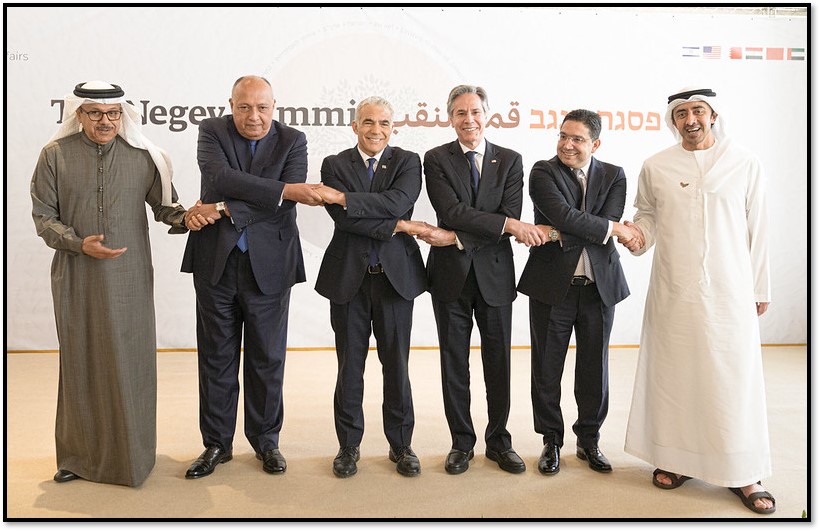March 28

Regional Diplomacy: Iranian Foreign Ministry Spokesman Saeed Khatibzadeh condemned the Negev Summit held in Israel. Foreign ministers from Bahrain, Egypt, Morocco, and the United Arab Emirates as well as the United States and Israel participated in the historic event. “Any attempt to normalize ties with the terrorist Zionists and the occupiers of al Quds (Jerusalem) is a stab in the back of the oppressed Palestinian people," Khatibzadeh said. “Palestine will not be liberated in any way other than resistance by the Palestinian people and support from the Islamic governments and nations.”
On day two of the Negev Summit, U.S. Secretary of State Antony Blinken and Israeli Foreign Minister Yair Lapid discussed Iran's destabilizing actions in the Middle East. “Iran continues to engage in a whole series of destabilizing activities across the region and beyond,” Blinken said. “The United States will continue to stand up to Iran when it threatens us or when it threatens our allies and partners, and we’ll continue to work with Israel to counter its aggression – its aggressive behavior throughout the region.”
March 29
Sports: Security forces barred some 2,000 women from entering a stadium in Mashhad to watch a World Cup qualifier against Lebanon. Despite purchasing tickets for the match, all women were turned away. In the ensuing controversy, President Ebrahim Raisi called on the Interior Ministry to investigate the incident.
Iranian security forces on Tue reportedly used pepper spray to stop women from entering a football stadium.
— Kian Sharifi (@KianSharifi) March 29, 2022
The women had legally purchased tickets to watch the men's national team take on Lebanon in Mashhad in their final game of the 2022 WC qualifiers.pic.twitter.com/MNJZrj2CB0
Since the 1979 revolution, women were mostly banned from attending men’s soccer matches. But in 2019, FIFA, the world soccer governing body, ordered Iran to allow women to enter stadiums. Iran complied with the order by allowing women to watch a match in October 2019.
Diplomacy: Iranian Foreign Ministry Spokesman Khatibzadeh kicked off a trip to Africa with a visit to Senegal, where he met with senior officials and civil society leaders. “In Iran's balanced [foreign policy], #Africa holds a very significant place,” he tweeted.
March 30
Sanctions: The United States sanctioned an Iranian man and four companies for procuring equipment used in Iran’s ballistic missile program. “We have taken this action following Iran’s recent missile attack on Erbil, Iraq, as well as missile attacks by Iranian proxies against Saudi Arabia and the United Arab Emirates,” Secretary of State Antony Blinken said. “These attacks are a reminder that Iran’s development and proliferation of ballistic missiles pose a serious threat to regional and international security.”
Diplomacy: Iranian Foreign Minister Hossein Amir-Abdollahian traveled to China to participate in a conference on Afghanistan's stability and development. “Afghanistan deserves more attention from the international community,” he tweeted upon arrival. “Iran and China reaffirm their support for the independence and national unity of Afghanistan and the Afghan people’s right to decide their fate, and they hope to see a stable and developed Afghanistan that would interact with neighbors.” The foreign ministers of Afghanistan's neighbors, including China, Iran, Pakistan, Tajikistan, Turkmenistan, and Uzbekistan as well as Russia attended. Special envoys from the United States, Russia, and China were due to meet separately.
Nuclear: In a meeting with his Qatari counterpart in China, Iranian Foreign Minister Amir-Abdollahian urged the United States to change course in talks on restoring the 2015 nuclear deal. “The United States must abandon its excessive demands so that weeks of intensive efforts by different sides in Vienna will lead to the necessary outcome,” he said.
March 31
Diplomacy: "Neighboring countries should play an important role in establishing peace and stability in Afghanistan because peace and stability in Afghanistan, just like insecurity, can have a direct impact on its neighbors," Foreign Minister Amir-Abdollahian said in China. "We should reinforce mechanisms required to help promote security in Afghanistan, and a clear security mechanism should be devised within the framework of the existing organizations or as an independent body to coordinate policies to fight terrorism."
Diplomacy: On the sidelines of the Afghanistan conference in China, Foreign Minister Amir-Abdollahian met with Chinese Foreign Minister Wang Yi to discuss bilateral ties. Amir-Abdollahian highlighted the shared struggle "against efforts to politicize the issue of human rights and against interference in the internal affairs of other countries as a key aspect of this cooperation." Yi emphasized the need to implement the vision of the 25-year strategic agreement between the two nations.
